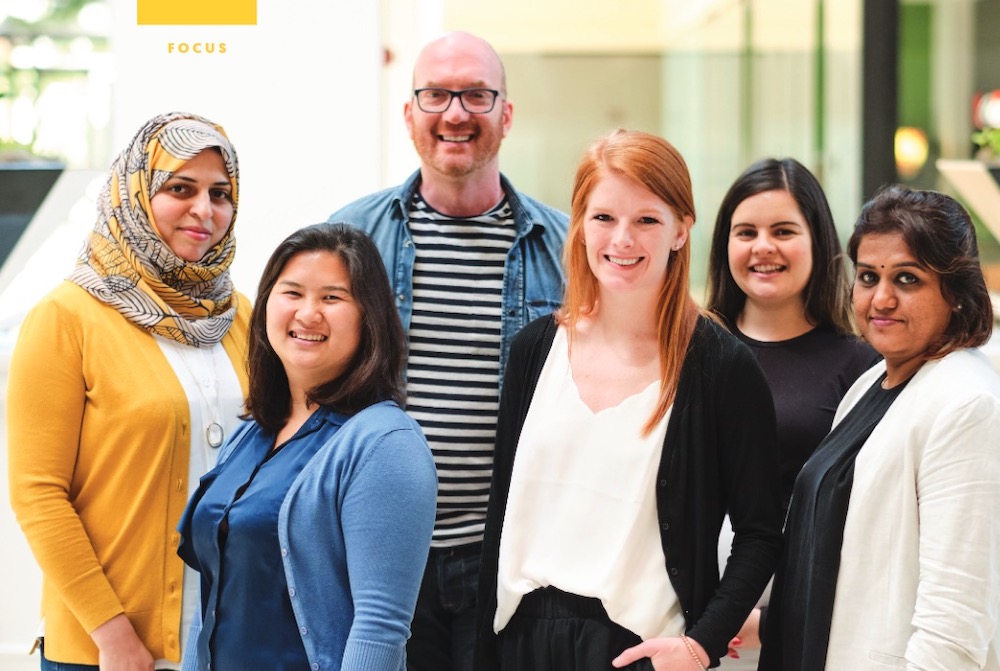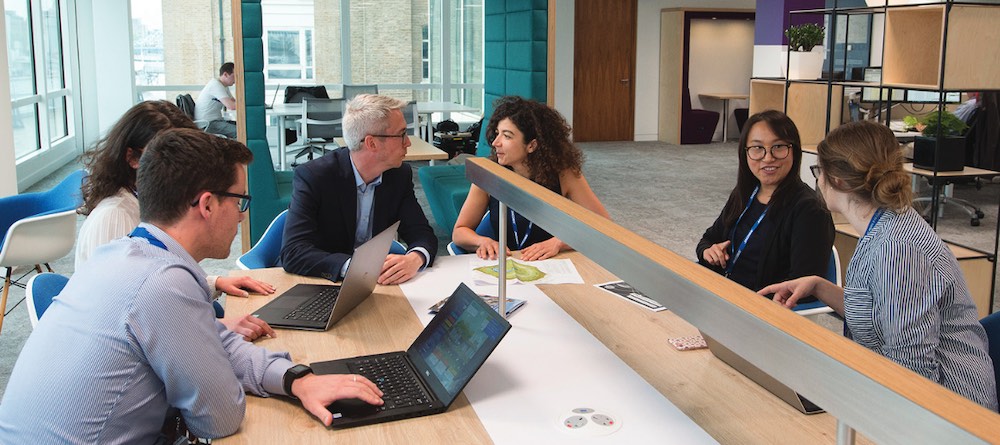The Context
In 2015, Steve Demetriou was hired as the new CEO of Jacobs, a global professional consulting and technical services firm with a talent force of approximately 55,000 in more than 40 countries, and a year later was appointed Chair of the Jacobs’ Board of Directors.
Under Demetriou’s leadership, the executive team redefined its strategy to better compete in a complex and fast-changing marketplace. The company needed to transform from an engineering and construction firm to a technology-first solutions provider – “a company like no other” that was committed to constantly “challenging today to reinvent tomorrow” in order to fulfill its mission of creating a more connected and sustainable world.
Demetriou and his team knew that culture change was at the heart of this transformation. Working together, Demetriou and Executive Vice President, Chief People & Inclusion Officer Shelie Gustafson identified three pillars to underpin the company’s new culture: Inspiration, Inclusion and Innovation. In addition to pulling other levers for culture change like employee network groups and aligning programs, policies and incentives, Jacobs collaborated with Duke Corporate Education (Duke CE) to design and deliver an executive development program to embed the three culture pillars at the highest levels of the company.
In early 2020, after a successful rollout of the Executive Leadership Program (ELP), it was time to cascade critical behavior changes as well as the strategic leadership messages from the ELP to the next tier of leaders at Jacobs — more than 1,500 Director-level and higher leaders from across the globe — to achieve culture alignment and further the company’s transformation.
Through a variety of design conversations, the Jacobs-Duke CE team evolved the ELP into the Amplif(i)3 program to cascade the messages and bring Inspiration, Inclusion and Innovation to life within the company’s culture through this next cohort of leaders. This program was designed to be more practical and practice-based to ensure the immediate application of teachings in the workplace.
The Offering
Amplif(i)3 was intended to be delivered as a three-day face-to-face leadership program with approximately 100 leaders per cohort. However, the March 2020 onset of the Covid-19 pandemic required the team to reimagine this delivery in a virtual format.
Three days of content, each focused on a single culture pillar, were transformed into an immersive 10-week virtual journey consisting of three modules, each with 10 hours of asynchronous and synchronous learning and application exercises, spread across three hours per week for approximately 50 learners per cohort.
Underpinning the full program was the framework of being accountable for one’s own “leadership shadow,” or the impact one is having versus the intent alone, as well as the manifestation of company culture within one’s own team, coupled with the need to be a T-shaped leader with deep expertise in a particular area and an overarching strategic focus on the business.
Module 1
Module 1 of the Amplif(i)3 program focused on the first culture pillar: Inspire Authentically: Connecting to What Matters. This module examined the role of inspirational leadership in creating alignment, elevating engagement, and fostering a culture of innovation and inclusion. Then Duke CE CEO Michael Chavez, author of Rehumanizing Leadership: Putting Purpose Back into Business, spoke about the benefits of highly-engaged and inclusive cultures in delivering against business objectives and shared how leaders can translate corporate purpose (“big P purpose”) at the team and individual level (“small P purpose”). Inviting participants to ask key questions like “Why are we doing this work?” and “How does it relate to Jacobs’ overall purpose?,” Chavez led an exercise whereby program participants crafted their own team purpose narrative to align with the overarching company purpose. He also asked participants to reflect on their own “leadership shadow” and identify behaviors that might be incongruent with the company culture and their intent.
Module 2
Module 2 focused on the second culture pillar: Live Inclusively: Building Diverse Networks and Creating Belonging. Led by leadership expert Elsbeth Johnson and Professor at Duke University’s Fuqua School of Business Dr. Daisy Lovelace, this module introduced the concepts of diversity, inclusion and belonging and how they differ, as well as the benefits of a diverse, inclusive organization. It shared the key tools and frameworks leaders can use to empower inclusion at all levels of the organization through creating and sustaining diverse networks. Johnson asked participants to identify actions they could take to build a more diverse, inclusive team, while Lovelace asked participants to identify behaviors on their teams that could promote or inhibit diversity and inclusion. Participants were also tasked with conducting a “network analysis” to understand how their implicit biases are built into their existing networks and to develop an action plan for enhancing the inclusive quality of their networks.
Module 3
The last module of the program focused on the third culture pillar: Innovate Every Day: Turning Possibilities into Reality. Duke CE brought innovation expert Rob Cordova to introduce tools and techniques like divergent and convergent thinking to help participants generate creative ideas and lead conversations and processes to drive everyday innovation in their teams. Participants were then tasked with leading a separate creative brainstorming session with their teams and returned to a session where they narrowed down top ideas to pursue with their teams.
Throughout the 10-week journey, in addition to virtual instructor-led training and fireside chats with Jacobs executives, participants attended “office hours” with subject-matter experts where they could ask questions and test the application of their learning. Participants also had application exercises and “leadership experiments” designed to ensure the application of learning back at work.
The program was led by a Jacobs orchestrator whose role was to further extend application of learning back at work. Each cohort was engaged by a Jacobs executive who partnered with participants throughout their learning journey. These leaders attended virtual sessions, while also hosting their own informal chats with participants.
This training is a major factor in driving culture change;
the messages that we are sending around inspiration, inclusion and innovation are proving extremely important for the overall employee experience and their engagement.
Steve Demetriou, Chair and CEO, Jacobs
The Results
The Amplif(i)3 program has been successfully rolled out for hundreds of leaders at Jacobs, helping to cascade the strategic and leadership messages from the ELP throughout the organization and encourage more diverse, inclusive and innovative teams. In this video, Shelie Gustafson and Michael Chavez discuss the program.
A participant pulse survey following the program revealed that the top leadership priorities of participants reflected the program topics of inspiration, inclusion and innovation. The majority of participants indicated that it was their responsibility to drive inclusion at Jacobs. Most also indicated they felt safe to take risks at Jacobs in the spirit of innovation and to discuss issues of inclusion, diversity and belonging with their superiors and their teams.
CEO Steve Demetriou touts the program as a major factor driving culture change within the organization – and the bottom line has seen an impact, too. Between October 2015 and September 29, 2021, Jacobs delivered a total shareholder return 280% above the S&P 500, which was up 155% during the same period.
According to Shelie Gustafson, “to a great extent, our success is the result of our business aligned cultural transformation and a growing sense of belonging within the Jacobs team. We continue to measure the impact of the intervention on the culture and business at Jacobs and are pleased with the outcomes and results.”

Hear from the Jacobs team in this Dialogue article about driving innovation and inclusion at the company.
